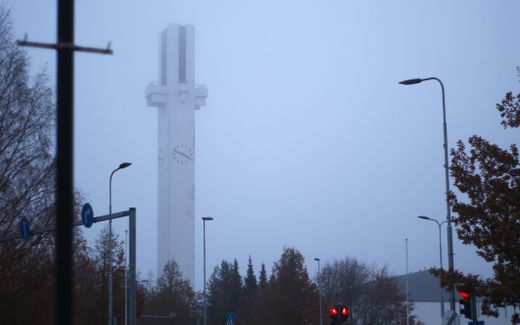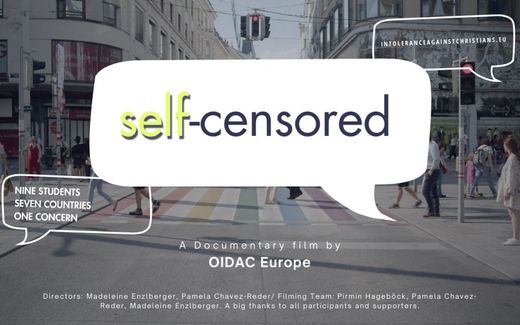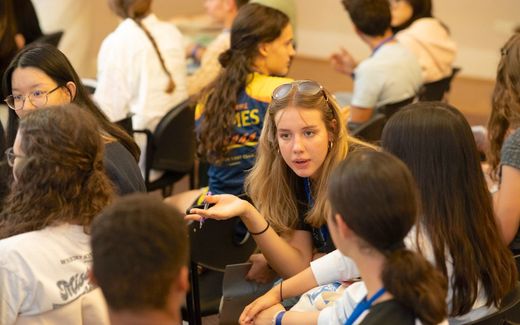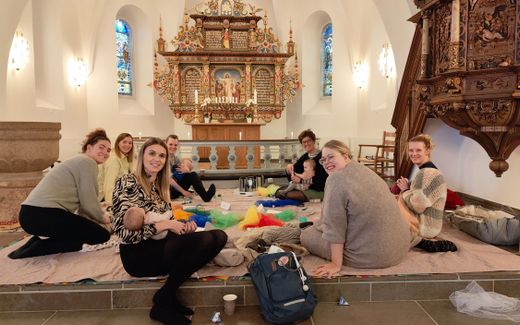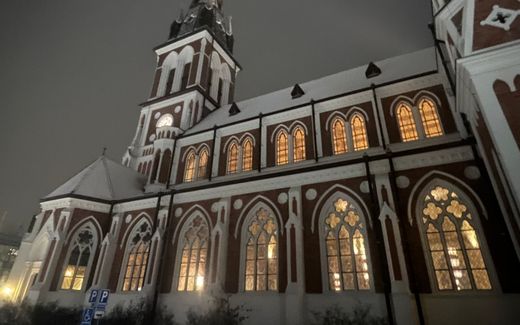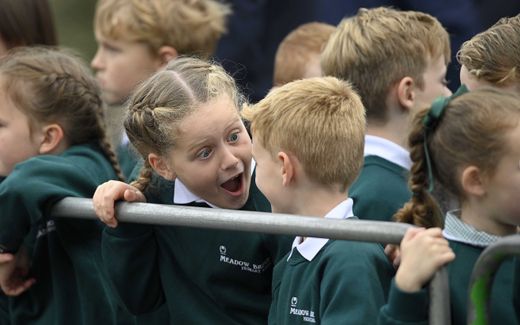Christian school on a tightrope on coast in Finland
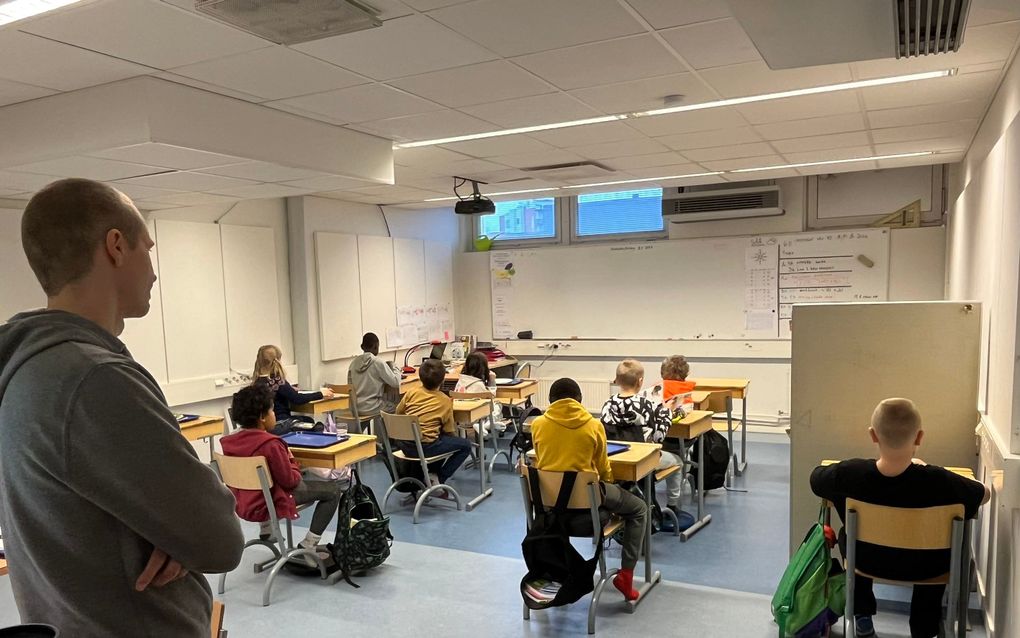
Classes are small in the Vaasa Christian school. Photo CNE.news, Evert van Vlastuin
Northern Europe
Christian schools were never really needed in Finland, people thought. Today, that is different. Christians from various denominations are joining hands. Together, they are treading a narrow path between footholds.
Traffic races along the wet main street in Vaasa. The sound echoes against the facade of the office building. On the second floor sits the Vaasan Kristillinen Koulu (Vaasa Christian School). Here, you enter not across the school playground but through a series of stairs.
Welcome to the region's only Christian school, laughs headmaster Henrik Vähäkangas. Ostrobothnia may be Finland's Biblebelt, but Christian education has no tradition here. "The nearest Christian schools are 300 kilometres to the east and 200 kilometres to the south," he says.
Yet Christian education is on the rise, says Vähäkangas. "In Seinäjoki –one of the centres of the Biblebelt in Finland– parents want to expand a childcare centre into a school."
Port city
At the Vaasa school, the groups are small, and the children are lively. Some pupils start asking questions in good English. "Vaasa is a port city and has a relatively high number of immigrants for Finland," the director explains. Some children also came to the city as asylum seekers.
In the Vaasa area, many children also speak Swedish, Finland's second language. The Swedish community on the Gulf of Bothnia is often also very church-like. Many revivals have occurred in this area in the past. Vähäkangas: "Unfortunately, the city of Vaasa itself has never had a revival. Somehow, you still notice that. That's why we pray that it still happens."
As a boy, Vähäkangas attended a public school. But those days were different, he explains. "I'm 40. In my time, public schools were mostly Christian. We prayed before meals. And every week, a pastor from the Lutheran Church came for an assembly. School values were largely Christian. In that situation, nobody needed separate Christian schools."
The headmaster says that everything has changed. As in the rest of Europe, Christian values in education are under pressure. Vähäkangas: "Humanism has replaced it, or something else. That affects almost everything in school."
The school in Vaasa began as a homeschooling project in 2008. A Lutheran pastor felt the need for Christian education. "By the way, it was a female pastor, maybe not the most obvious one," Vähäkangas says with a smile. "But she developed a vision for the school and gathered people around her. An association was formed from homeschooling and worked towards the school application."
The school is for children of all faiths. Vähäkangas estimates that 80 per cent of the pupils have a Christian background. "But honestly, I don't know exactly. We also don't ask what denomination children are from: Lutheran, Pentecostal, Evangelical. All that matters is that parents respect the school's Christian values."
The school has about 100 students, spread across nine grades. Most of the children come from the city of Vaasa itself. "But a few come from 50 kilometres away."
The reasons why parents send their children to the Christian school vary, says Vähäkangas. "For some, it is important that the school is small and convenient. For others, it's really about the Christian vision. That variety is allowed. The most important thing for us is that they cooperate with us."
Warm meal
It is dinner time. A volunteer –a pastor from the area– has cooked a meal in the canteen. This is a requirement for every school, says a teacher. "Many children would otherwise not get any warm meal at all."
The school has to comply with many rules. For example, children are not allowed to be photographed recognisably, and some are not allowed to be photographed at all.
A wooden cross hangs in the corner of the canteen. It is one of the few references to Christianity in the school. More is not allowed, the headmaster explains. "According to the law, teaching cannot contain religious elements. You cannot talk about God and the Bible, you cannot pray, and you cannot even sing Christian songs with the children. A communal moment of worship must be left out of the timetable."

Specifically, the day's opening takes place before the school day officially starts. Parents cooperate to ensure that children are in school earlier.
The school is allowed to start from Christian values, though. "But the outworking of those values is soon problematic," the headmaster explains. "For the future, that is worrying."
For the school itself, Christian values mean that every child is made in God's image. "That is at the heart of everything."
Expressly incorporating Biblical insights into regular lessons is difficult, says Vähäkangas. "According to the law, it is actually impossible," he says with a smile. "When it comes to sexuality, we try to explain that there are different views. The same goes for biology; next to the Big Bang theory is the Biblical creation story. But the path is narrow – that is clear."
The best opportunities lie in religious education. As a Christian institution, the school may limit itself to one vision. "Here we tell the stories from the Bible."
Still, the school has an assembly every week. Just like it used to be at Vähäkangas' school, only now outside official school hours. "Then a pastor from the area comes to sing, pray, and reflect on something from the Bible with us."
Applicants
Vähäkangas turns his laptop and shows an illustration of a fruit tree with deep roots. "For those fruits, it is still too early. With the young child, it's about rooting and growing in fertile soil. Our job is to help in that." This is the model he also shows to the education inspectorate. "They don't believe in the Bible. But we naturally hope our pupils learn to live from Christian values."
Vähäkangas always speaks of "we"; the team of teachers. He cannot officially ask applicants to be Christian in recruitment. He smiles again. "Well, you search in your network and point people to the vacancy. We never ask about denominations or views on baptism. I do hope we attract people with a personal faith in Jesus Christ. Outside working hours, we regularly seek spiritual guidance and pray together as a team. Then you need to know that you can rely on each other."
Secular tendency of public schools in Finland necessitates Christian education
Finland has seventeen Christian schools at the moment. And this number is growing, says Chairman Jukka Sipilä from the Association for Christian Schools and Kindergartens (Kristillisten koulujen ja päiväkotien liitto ry). Parents' interest in existing schools is growing, too.
What is the legal position for Christian education in Finland?
"In Finland, we have a very strong public school system. It is very difficult to get permission for a private school. Permission gives you access to financial support from the state, but that is lower than support for public schools."
Some countries have a long tradition of separate Christian schools. How is that in Finland?
"Christianity was a normal part of the school system until the 1970s. The first Christian school was founded in 1932 by Adventists. However, a new wave of Christian education started in the 1990s, when the school in Helsinki started.
We currently have 17 schools and applications for two new schools. In general, the number of pupils in Christian schools is growing. Christian schools are mostly for pupils aged 6 to 16."
What is the background of this new wave of Christian schools in your country?
"Many families wanted to educate their children and a Christian worldview. General development in public schools has led in a secular direction. New Christian schools are a reaction to this."
What religious background do the children have?
"There is only one demand for families who want their children to get into a Christian school: that they accept the curriculum. We are not checking whether the families belong to a church."
What is the financial position of Christian schools?
"When a school gets a license to educate, it receives basic financing. Collecting fees from the pupils is not allowed, but voluntary support is needed. In general, the financing from the state is over 90 per cent."
What are the possibilities for Christian elements in the school?
"It is possible, for example, to start a day by reading the Bible and praying shortly. But a normal lesson may not be like a worship service. We can have Christian elements in our celebrities. In daily education, there is room for a Christian perspective on different school subjects. That is very important."
Related Articles


